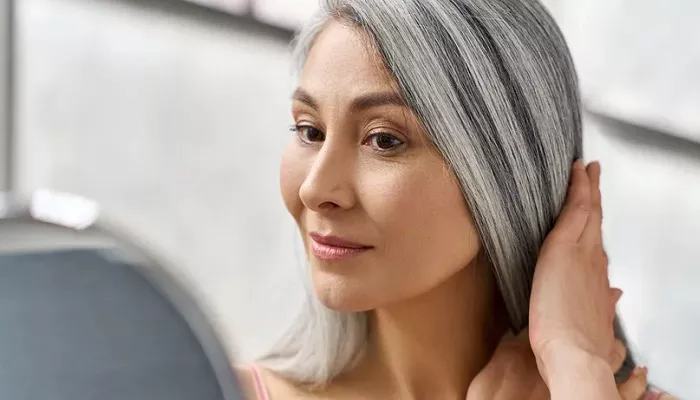Hair loss is a common yet often overlooked challenge that many women face, particularly during menopause. While it’s frequently associated with men, women are also prone to experiencing thinning hair, with menopause serving as a significant trigger. Roughly one-third of women will notice hair thinning at some point, and for many, this can be a difficult emotional experience.
The Menopause-Hair Loss Connection
For many women, hair represents more than just an aesthetic feature—it’s closely tied to self-image and confidence. Therefore, the onset of thinning hair during menopause can feel like yet another unwelcome symptom. The primary cause behind this hair thinning is hormonal changes, particularly a decrease in oestrogen levels. This hormone, which helps maintain hair health, plays a crucial role in keeping hair full and thick. When oestrogen levels decline, hair growth slows down, strands become finer, and shedding increases—often manifesting as a widening part or thinning across the scalp.
Endocrinologist Dr. Nellie Torkamani explains, “49 percent of women will experience hair loss at some point in their lives. For many, it will be temporary, with hair regrowth following menopause, while for others, the loss may be permanent.” If you notice more hair shedding than usual, Dr. Torkamani advises consulting a GP to determine the cause, as early intervention can help.
Additional Factors Contributing to Hair Loss
While hormonal changes play a key role in menopausal hair thinning, several other factors can contribute to hair loss:
Genetics: A family history of hair thinning can increase your likelihood of experiencing it as well.
Stress: The emotional rollercoaster of menopause can lead to heightened stress levels, which in turn can trigger hair shedding.
Nutrient Deficiencies: Lack of key vitamins and minerals—such as iron, zinc, and biotin—can impact hair health.
Ageing: As we age, hair naturally becomes finer and grows more slowly, which can contribute to thinning.
Proactive Steps for Healthy Hair During Menopause
While hair thinning during menopause is common, there are various steps you can take to help maintain healthy, strong hair:
1. Nourish Your Hair from Within
A balanced diet plays a significant role in hair health. Ensure you’re getting enough iron, zinc, biotin, and vitamins A, C, D, and E. Protein-rich foods like eggs, fish, nuts, and seeds, along with a variety of fruits and vegetables, can help keep your hair strong and nourished.
2. Be Gentle with Your Hair
Gentle care is crucial to maintaining hair health. Opt for sulfate-free, hydrating shampoos and conditioners, and avoid excessive heat styling. Tight hairstyles that pull on your scalp should also be avoided to prevent additional stress on your hair follicles.
3. Manage Stress
Although reducing stress can be challenging, it’s important to manage it to support overall hair health. Whether through regular exercise, meditation, or simply taking time for yourself, finding ways to relax can help minimize hair shedding.
4. Consider Targeted Hair Treatments
If you’re looking for an extra boost, targeted treatments like the Calecim Professional ADVANCED HAIR SYSTEM may be worth considering. This six-week program is designed to support thinning hair and encourage regrowth. The formula contains PTT-6, a blend of ingredients including fibronectins, glycoproteins, collagen, and hyaluronic acid, which work together to stimulate sluggish hair follicles.
How the Treatment Works:
Creates an optimal environment for growth: PTT-6 enhances the health of hair follicles, encouraging them to thrive.
Boosts thickness and density: It nourishes the scalp and stimulates follicles, contributing to fuller-looking hair.
Reduces shedding: By improving follicle function, it helps minimize hair loss.
Many users of the Calecim system report visible improvements in hair health and growth, with thicker, healthier hair and a reduction in shedding.
Important Considerations
While the Calecim ADVANCED HAIR SYSTEM shows promise, it’s important to consider any underlying conditions that may affect its effectiveness. For more information on these conditions, refer to the product details.
Navigating Menopausal Hair Changes with Confidence
Hair loss during menopause is a natural part of the aging process, but with the right approach, you can navigate these changes with confidence. Embrace self-care and seek professional guidance to make informed decisions about your hair health. By taking proactive steps, whether through diet, gentle hair care, or targeted treatments, you can maintain a sense of control during this phase of life.
Related topics:
- Synthetic Hair Styles May Pose Health Risks, Consumer Reports Warns
- Breakthrough Discovery Brings Us Closer to Regrowing Hair
- Nutritionist Shares Key Nutrients to Combat Postpartum Hair Loss


